Meet the Trainee Council
Since 2001, the Trainee Council has provided a forum for hematology fellows to discuss issues relevant to fellowship training and career development and provides suggestions regarding programs that may increase interest in hematology. The council projects include Hematopoiesis, Ash-a-Palooza and other trainee activities at the ASH annual meeting, Grants Clearinghouse, ASH Hematology Career Planner, and more.
The Trainee Council consists of MD, MD, PhD, and PhD trainees from across North America. The council is governed by a chair who is elected by the members of the council and each council member serves a two-year term.
Second-Year Council Members FIRST-YEAR COUNCIL MEMBERSSince 2023 the council has expanded to include four new positions:
- Medical student
- PhD student in a hematology laboratory
- Resident (MD, DO, MD/PhD enrolled in a duly accredited residency program related to internal medicine that may lead to hematology-related practice)
- A clinical or post-doctoral fellow from outside of North America
Fellows are invited to apply for a position on the Trainee Council at the top of each year. Trainees who exhibit leadership qualities and a high potential for a successful career in hematology or a hematology-related discipline are the best fit.
Second-Year Council Members

Damilola Akani, MD, MPH, Ann and Robert H. Lurie Children’s Hospital
Dr. Damilola Akani received her medical degree from University of California, San Diego. She then went on to complete her pediatric residency training at Children’s National Hospital. She is currently a second-year hematology and oncology fellow at Ann and Robert H. Lurie Children’s Hospital. Her research interests are in sickle disease, health technology and global health. She is also interested in mentorship, particularly supporting underrepresented medical trainees.

Donovan Argueta, PhD, UC Irvine
Dr. Donovan Argueta is a postdoctoral scholar and NIH MOSAIC K99 fellow at the University of California, Irvine. Dr. Argueta received his Ph.D. in bioengineering from the University of California, Riverside for investigating the role of peripheral endocannabinoid signaling in the gut-brain axis control of feeding with an emphasis on high-throughput instrumentation. His current research focuses on uncovering the molecular underpinnings of pain in sickle cell disease, utilizing cellular and animal models to evaluate the impact of environment and psychosocial factors on pain pathobiology. As a MOSAIC K99 fellow, he is interested in social determinants of health and complementary approaches to target pain while addressing matters of systemic inequity in health and education. Dr. Argueta’s goals are to establish a research laboratory to continue investigating the pathobiology of pain in sickle cell disease to develop novel, actionable targets for safe, effective, and accessible pain management.

Jeffrey Edwards, MD, MPH, Boston children's hospital & boston medical center
@Djeffreedom
Dr. Jeffrey Edwards is a Chief Resident in pediatrics at Boston Children's Hospital and Boston Medical Center. He completed his undergraduate studies at Harvard College, medical school at Stanford Univerity School of Medicine and MPH at Johns Hopkins Bloomberg School of Public Health, concentrating in Health Systems & Policy. His research and advocacy interests are in promoting health equity in both domestic and global settings by understanding the roles that structural determinants of health play in sickle cell disease outcomes.
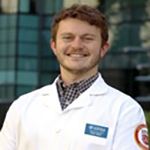
Ryan Mack, BS, BS, Stritch School of Medicine, Loyola University Chicago
@RyanMack220
Ryan Mack is a 7th-year MD/PhD student at Loyola University Chicago’s Stritch School of Medicine. He is currently a PhD candidate in the Biochemistry, Molecular, and Cancer Biology Program in the Department of Cancer Biology. As a predoctoral fellow in the Zhang lab, his dissertation work focuses on the postnatal-to-adult transition of hematopoietic stem and progenitor cells, myeloid/megakaryocyte differentiation, and how these processes relate to malignant transformation. Ryan is excited to return to his clinical training, where he hopes to pursue interests in malignant and non-malignant hematology through a physician-scientist training program in hematopathology and molecular genetic pathology.

Agrima Mian, MD, Cleveland Clinic
Dr. Agrima Mian received her medical degree from Manipal University, India, where she was awarded the best outgoing medical graduate, and trained at the All-India Institute of Medical Sciences (AIIMS), New Delhi for Internal Medicine residency, graduating in 2018. She pursued a clinical research fellowship in the lymphoid malignancies division at Taussig Cancer Center, Cleveland Clinic in 2019. She subsequently completed Internal Medicine residency at Cleveland Clinic and is now enrolled in the second year of their hematology/oncology fellowship program. Her research is focused on real world clinical outcomes and toxicities of CAR T-cell therapy in lymphoma, and translational studies to explore immunophenotypic differences in newly diagnosed and relapsed/refractory lymphoma. She is also developing a clinical trial to enhance allogeneic NK-cell therapy with combination of monoclonal antibodies for treatment of relapsed/refractory lymphoma. Dr. Mian is interested in developing a career as a clinical trialist and translational researcher in malignant hematology, with special focus on lymphoid malignancies, novel cellular therapies, and stem cell transplantation. She is also interested in improving support for international medical graduates pursuing an academic career in malignant hematology.

Andrés Noyola-Pérez, Universidad Autónoma De Nuevo León - Mexico
@Andresnoyolaa
Andrés Noyola-Pérez is a final-year medical student at the Universidad Autónoma de Nuevo León (UANL) School of Medicine. He has been actively involved in hematology research since 2021, working with the Hematology Department at UANL under the tutelage of Dr. Andrés Gómez-De León. Andrés is a past recipient of the ASH HONORS award, and the ASH Abstract Achievement Award. His research focuses on health equity in hematology and oncology, including clinical trial disparities, patient-relevant outcomes, and healthcare access. Andrés is passionate about addressing health inequities and improving healthcare access for underserved populations.
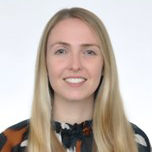
Charlotte Story, MD, Johns Hopkins Hospital
@the_heme_story
Dr. Charlotte Story attended medical school at UNC School of Medicine, where she received a Glasgow-Rubin Citation for Academic Achievement from the AMWA for graduating at the top of her class. She was also an HONORS award recipient and presented her work at ASH's annual meeting and at ASTCT's Tandem Meeting. She did her Internal Medicine residency at Brigham and Women's Hospital and is now a Hematology fellow at Johns Hopkins Hospital. She has published on multiple topics during her training and has a particular interest in coagulation and complement-mediated disorders.
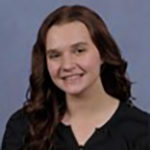
Jenna Thibodeau, BS, PhD candidate, Wayne State University
@ThibodeauJ58180
Jenna Thibodeau holds a Bachelor's degree in Biochemistry and Molecular Biology from Michigan State University and is currently in her second year of PhD training in the Cancer Biology Program at Wayne State University. She studies relapsed/refractory myeloid leukemia associated with Down Syndrome (ML-DS) under the mentorship of Dr. Yubin Ge and Dr. Jeffrey Taub. Jenna's research focuses on the molecular mechanisms underlying relapse and chemotherapy resistance in ML-DS, aiming to identify new therapeutic targets to improve patient outcomes. Her work contributes to uncovering key aspects of leukemic cell survival and resistance pathways, paving the way for potential innovative treatments. Passionate about bridging the gap between laboratory discoveries and clinical applications, Jenna aspires to continue her research in hematology/oncology within the Down Syndrome field. She is dedicated to enhancing her scientific knowledge and improving patient outcomes for vulnerable populations through her research and advocacy.

Natalia Tijaro Ovalle, MD, Memorial Sloan Kettering Cancer Center
@TijaroNatalia
Dr. Natalia Tijaro Ovalle received her medical degree from Universidad de Los Andes in Bogotá, Colombia, and completed her Internal Medicine residency at Yale New Haven Hospital, where she served as the co-president of the Yale Resident/Fellow Senate. She is currently a second-year hematology/oncology fellow at Memorial Sloan Kettering Cancer Center. Dr. Tijaro plans to pursue a career as a clinical researcher in malignant hematology with a focus in stem cell transplant and cellular therapy. She also has a keen interest in advocacy for underserved patients and underrepresented trainees.
.jpg?la=en&h=150&w=150&hash=CDFC21598AE7BF1B210AE23B222F0EC5)
Christopher Wanjiku, MD, University of North Carolina Chapel Hill
@Chrissmwaniki
Dr. Christopher Wanjiku is a current Hematology and Oncology Fellow at the University of North Carolina Chapel Hill. He attended medical school at the University of Nairobi in Kenya and completed residency training at Duke University. Before residency, he was extensively involved in implementing sickle cell and hemophilia care in Kenya. Dr. Wanjiku’s interest is in acute leukemias and cell therapy and improving access to care for marginalized communities. His current research involves optimizing access to cancer care via tele-oncology.
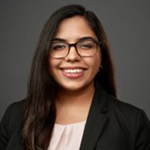
Ruby Arora, MD, University of Illinois at Chicago
Dr. Ruby Arora is currently a PGY-1 Internal Medicine Resident at the University of Illinois in Chicago. She graduated from Tulane University School of Medicine in 2024. Prior to medical school, she worked as a clinical research coordinator at Washington University in St. Louis with a focus on lymphoma clinical trials. She is an alumni of the Memorial Sloan Kettering Summer Medical Student Research Fellowship. Dr. Arora plans to pursue a career in malignant hematology with a focus on healthcare disparities and advocacy for underserved patients.
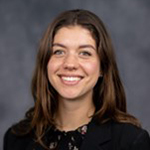
Claire Drysdale, BA, BSc, Regents of the University of Michigan
Claire Drysdale is a 6th-year MD/PhD student at the University of Michigan, Ann Arbor. Before matriculating at Michigan, she completed a post-baccalaureate intramural research fellowship at the NIH/NHLBI focused on gene therapy for sickle cell disease. She is currently completing her PhD in Cell and Developmental Biology in the lab of Rami Khoriaty, where she is investigating novel targets for fetal hemoglobin induction, which may lead to improved treatments for beta-hemoglobinopathies. After finishing her MD/PhD, she plans to pursue her clinical and research interests in beta-hemoglobinopathies through a physician-scientist training program in hematology.
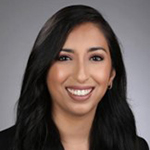
Ritika Dutta, MD, Stanford University
X: @ritikulocyte
Dr. Ritika Dutta graduated from Stanford School of Medicine and completed her Internal Medicine residency at Brigham and Women’s Hospital. She is a currently hematology/oncology fellow at Stanford. Her research in myeloid malignancies focuses on developing novel therapeutics, understanding mechanisms of bone marrow failure in leukemia, and investigating germline predisposition syndromes. She has presented her work at multiple prior ASH meetings and is an HHMI and HONORS award recipient. Ritika is also deeply engaged in health equity initiatives to reduce structural barriers to care and is passionate about mentorship of trainees. She hopes to develop a career as a clinician-investigator, leading clinical trials with correlative studies to bring insights from the lab to the bedside in an inclusive and equitable manner.
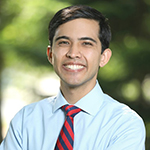
Nicholas C. Lee, MD, National Heart, Lung, and Blood Institute
X: @NickLeeMD
Dr. Nicholas Lee is currently a dual adult hematology and pediatric hematology/oncology fellow sponsored by the National Heart, Lung, and Blood Institute and the joint National Cancer Institute/Johns Hopkins University programs, respectively. He received his medical degree from Yale School of Medicine and trained in combined internal medicine and pediatrics residency at the University of Texas Southwestern Medical Center—where he was an HONORS Award recipient. Dr. Lee is focused on bone marrow failure diseases across the lifespan with an emphasis on translational research and clinical trials. He works with Dr. Neal Young’s group where he is investigating germline influences on bone marrow failure disorders and is an associate investigator on clinical trials in aplastic anemia and telomere biology disorders.
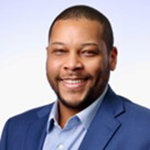
Randolph B. Lyde Jr., MD, PhD, UPMC Hillman Cancer Center
Dr. Randolph B. Lyde Jr. obtained his medical degree from the Lewis Katz School of Medicine at Temple University and his PhD from the University of Pennsylvania School of Medicine. He is currently a 1st year Hematology-Oncology Fellow at the University of Pittsburgh Medical Center where he also completed medical residency training in internal medicine. He is interested in both classic and malignant hematology and conducts research on sickle cell disease and leukemia. He is particularly interested in mentorship, health disparities, medical education and leadership and currently serves on the ASH Hematology Inclusion Pathway (HIP) Programs Subcommittee.
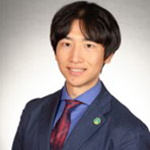
Yoshito Nishimura, MD, PhD, MPH, Mayo Clinic
X: @yoshi735
Dr. Yoshito Nishimura is a Hematology/Oncology Fellow at Mayo Clinic in Rochester, Minnesota. He earned his medical degree and completed his internal medicine residency and general internal medicine fellowship at Okayama University in Japan, as well as a PhD in immunopharmacology. After working at the Ministry of Health in Japan for global health policy, he completed an internal medicine residency and a chief residency at University of Hawaii. With over 130 peer-reviewed publications, his work has significantly advanced understanding of rare hematologic diseases and influenced clinical guidelines. Dr. Nishimura's research focuses on Castleman disease, oncoimmunology, and long-term cancer epidemiology and disparity studies among different racial and ethnic groups.

Mark Orland, MD, PhD Candidate, Case Western Reserve University
@OrlandMarkMD
Dr. Mark Orland is a current PhD candidate at Case Western Reserve University. He completed his medical school at University of Illinois College of Medicine at Chicago. His research in Dr. Jaroslaw Maciejewski's lab focuses on the clonal evolution and epigenetic dysregulation underlying myeloid malignancies, with a particular interest in how somatic alterations shape hematopoietic fitness and disease progression. Dr. Orland is passionate about bridging basic science discoveries with clinical application and aims to develop targeted therapeutic strategies informed by clonal and epigenetic architecture. He is currently a co-investigator for a clinical trial examining the impact of GLP-1s on clonal hematopoiesis. He is a committed physician-scientist advocate with experience in health policy and legislative outreach.
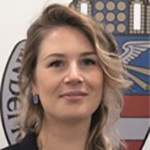
Maaike GJM van Bergen, PhD, Radboud University Medical Center, Nimegen, The Netherlands
Dr. Maaike van Bergen is a postdoctoral researcher at the Radboudumc in Nijmegen, the Netherlands. She is trained as a medical biologist and specializes in molecular hematology. In 2022, she obtained her PhD on transcription regulation of megakaryopoiesis at Radboud University in Nijmegen. She is now investigating clonal hematopoiesis in the general population. Her interests focus on identifying targets for early intervention strategies to ultimately help prevent the development of myeloid malignancies.
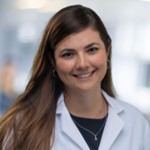
Carolina Velez-Mejia, MD, VCU Health
@cvelezmejia
Dr. Carolina Velez-Mejia received her medical degree from Universidad CES in Medellin, Colombia, and then completed her residency in Internal Medicine and Chief Year at the University of Texas at San Antonio. She is currently pursuing a fellowship in Hematology and Oncology at Virginia Commonwealth University. Her research has focused on understanding survival outcomes in underrepresented populations across different lymphoma subtypes. Dr. Velez-Mejia is interested in a career as a clinical educator and researcher in malignant hematology, with a special focus on lymphomas, health disparities, and advocacy for underserved patients.
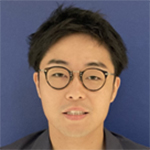
Taishi Yonezawa, PhD, Baylor College of Medicine
@TaishiYonezawa
When Dr. Taishi Yonezawa was in high school, he was diagnosed with myelodysplastic syndrome (MDS). Fortunately, he was cured through treatment that included chemotherapies and a bone marrow transplant from his sister. However, this experience inspired him and motivated his pursuit of a career in hematology research. Dr. Yonezawa received his Ph.D. at the University of Tokyo, Japan. His Ph.D. thesis work has established a therapeutic approach to hematologic malignancies targeting RUNX1 in the lab of Drs. Toshio Kitamura and Susumu Goyama. Dr. Yonezawa is currently a postdoctoral fellow in Dr. Margaret (“Peggy”) Goodell’s lab at Baylor College of Medicine. The side effects of current chemotherapies and bone marrow transplants for hematologic malignancies including MDS, even when curative, can often interfere with daily life. Therefore, Dr. Yonezawa became interested in the preleukemic stage, specifically clonal hematopoiesis (CH) and its prevention or treatment as CH is strongly associated with the risk of MDS. Dr. Taishi Yonezawa is developing a method that prevents and treats CH and MDS with fewer side effects.